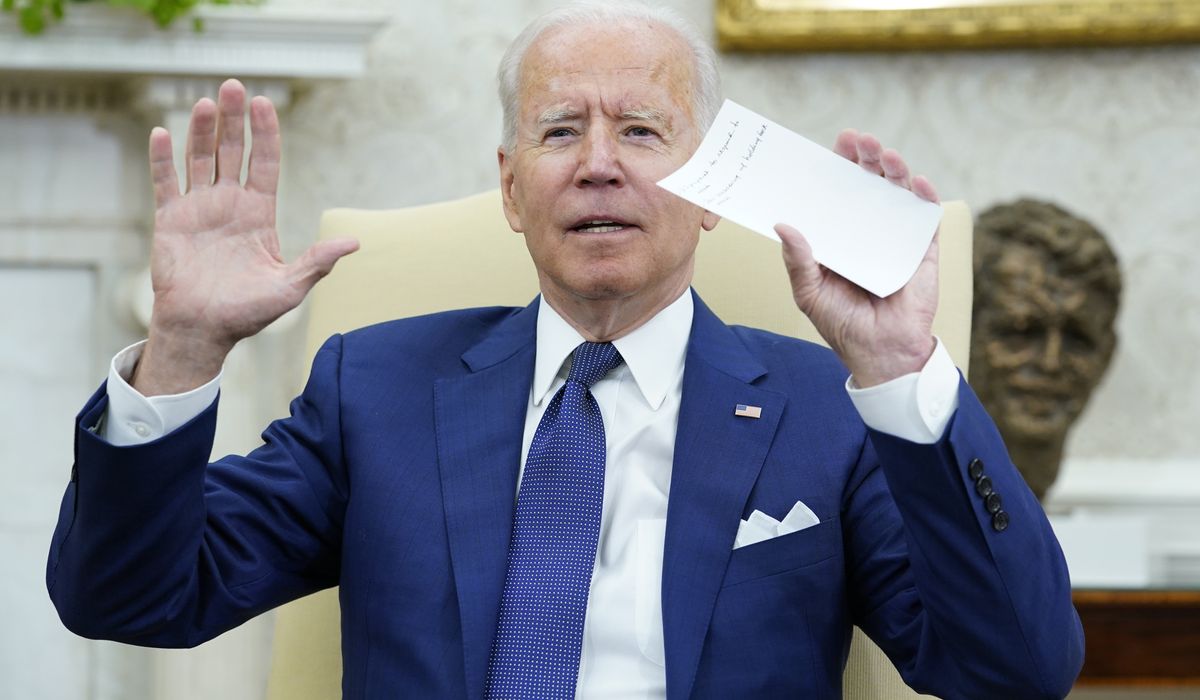Joe Biden to call off US combat mission in Iraq by the end of the year

The U.S. will end its combat mission in Iraq by the end of the year, President Biden announced Monday, with American forces shifting to an advisory and training role but potentially opening the door, critics say, for Iran to gain even more influence in the region.
It was the second confirmed major drawdown of a long-term U.S. military mission in Mr. Biden‘s brief presidency. The concurrent pullout of American and foreign troops from Afghanistan is nearly complete after two decades in the country.
Just before an Oval Office meeting with Iraqi Prime Minister Mustafa al-Kadhimi, the president laid out the revamped approach to Iraq, where U.S. forces have operated for most of the past 20 years. The U.S. has about 2,500 troops in the country, and it’s not clear exactly how many will remain there in a new capacity.
The withdrawals from Iraq and Afghanistan represent a major shift for post-9/11 U.S. foreign policy, which has been dominated for two decades by fights against terrorist groups based in Afghanistan and the Middle East. The Pentagon’s new military blueprint calls for U.S. forces to prepare to fight traditional state rivals, particularly Russia and China.
Despite the new American role, the president stressed that the U.S. will continue to battle remnants of the Islamic State group, also known as ISIS. The terrorist group no longer holds significant territory but still has many thousands of trained fighters in its ranks. ISIS recently claimed responsibility for a bombing in Baghdad that killed 35.
“Our shared fight against ISIS is critical for the stability of the region, and our counterterrorism cooperation will continue even as we shift to this new phase we are going to be talking about,†Mr. Biden said ahead of an Oval Office meeting with the Iraqi leader.
“Our role in Iraq will be … just to be available, to continue to train, to assist, to help, and to deal with ISIS as it arises. But we’re not going to be, by the end of the year, in a combat mission,†the president said.
The White House stressed that U.S. forces were not abandoning their Iraqi allies, who face terrorist threats and security challenges from powerful but semi-official Shiite militia groups with close ties to Iran.
“As this evolution continues, and as we formally end the combat mission and make clear that there are no American forces with a combat role in the country, Iraq has requested, and we very much agree, that they need continued training; support with logistics, intelligence, advisory capacity building â€" all of which will continue,†a senior administration official told reporters on a background call with reporters.
The official said the Iraqi forces are “battle-tested†and able to defend their country, but keeping the U.S. troops in an advisory capacity shows that the administration still recognizes the Islamic State as a threat.
Critics say Mr. Biden is taking a major gamble by undercutting U.S. leverage to shape the future of Iraq. U.S. forces stationed in Iraq and neighboring Syria have come under fire from Iran-backed militias such as Kata’ib Hezbollah and Kata’ib Sayyid al-Shuhada. They are part of the Popular Mobilization Forces, an umbrella organization for Shiite militias based in Iraq. Those two specific militias receive significant financial and logistical support from Iran.
Despite numerous U.S. airstrikes against the militias and despite the White House announcement, the groups warned that they would continue to target Americans.
“Regarding the U.S. military’s presence, names and titles do not matter, and they will still be targets for the weapons of resistance under any title or attribute,†said Nasr Al-Shammari, a spokesperson for the militia Al-Nujaba Resistance Movement, as quoted by Iran’s Fars News Agency.
Those comments suggest U.S. forces will be in danger even as the combat mission technically ends. That raises questions about the lengths to which Mr. Biden is willing to go to protect them. Already this year, at least eight drone attacks and 17 rocket attacks have targeted U.S. troops in Iraq and Syria.
Some specialists say Iran could take advantage of the new dynamic with a round of attacks.
“The White House may believe itself clever by rebranding its forces as non-combat experts, but this rhetorical sleight of hand doesn’t impress anyone outside of Washington or the Amtrak Corridor,†said former Defense Department official Michael Rubin, now a resident scholar at the American Enterprise Institute. “Anti-American forces smell blood in the water as the American withdrawal from Afghanistan turns into a Taliban rout, and learn the same lessons: Keep pecking away at the Americans and they will flee.â€
“It’s only a matter of time between one of the Iraqi militia rockets or an Iranian drone gets lucky and takes out a couple dozen Americans,†he said.
Others argue that Tehran can devote more energy to other theaters with the departure of American combat troops next door, potentially making it an even bigger player across the broader Middle East.
“The Islamic Republic of Iran, now the oldest and most outsized state threat to U.S. interests and allied security in the Middle East, couldn’t be happier,†said Behnam Ben Taleblu, a senior fellow at the Washington-based Foundation for Defense of Democracies.
“Iran sees Iraq as but one battlefield to best the U.S. Once this is complete, it will press ahead through escalation in other theaters, be it the Persian Gulf or Syria,†he said. “A diminishing U.S. force presence on Iran‘s eastern and western flank gives the world’s foremost state sponsor of terrorism more room for maneuver.â€
Sign up for Daily Newsletters
0 Response to "Joe Biden to call off US combat mission in Iraq by the end of the year"
Post a Comment